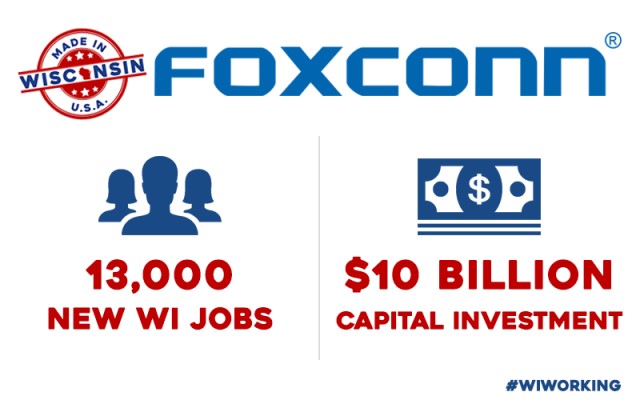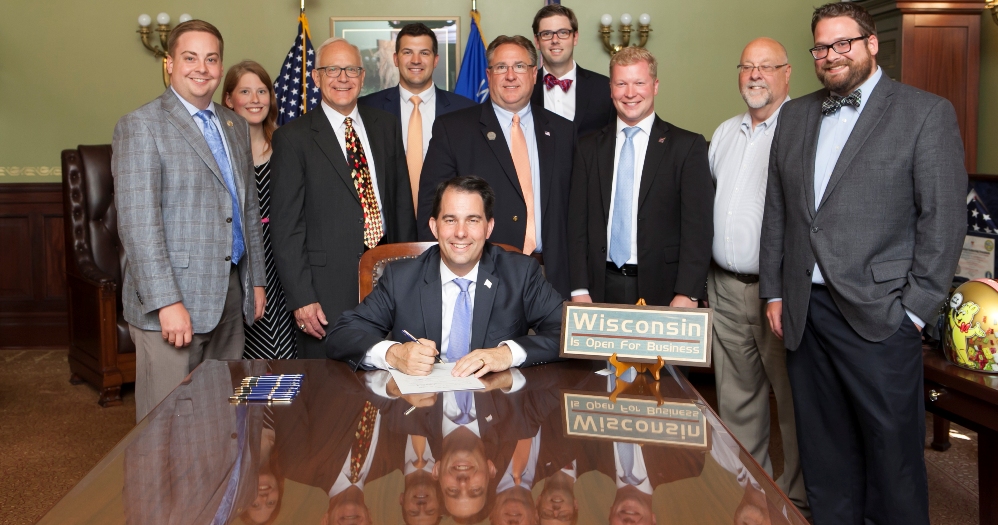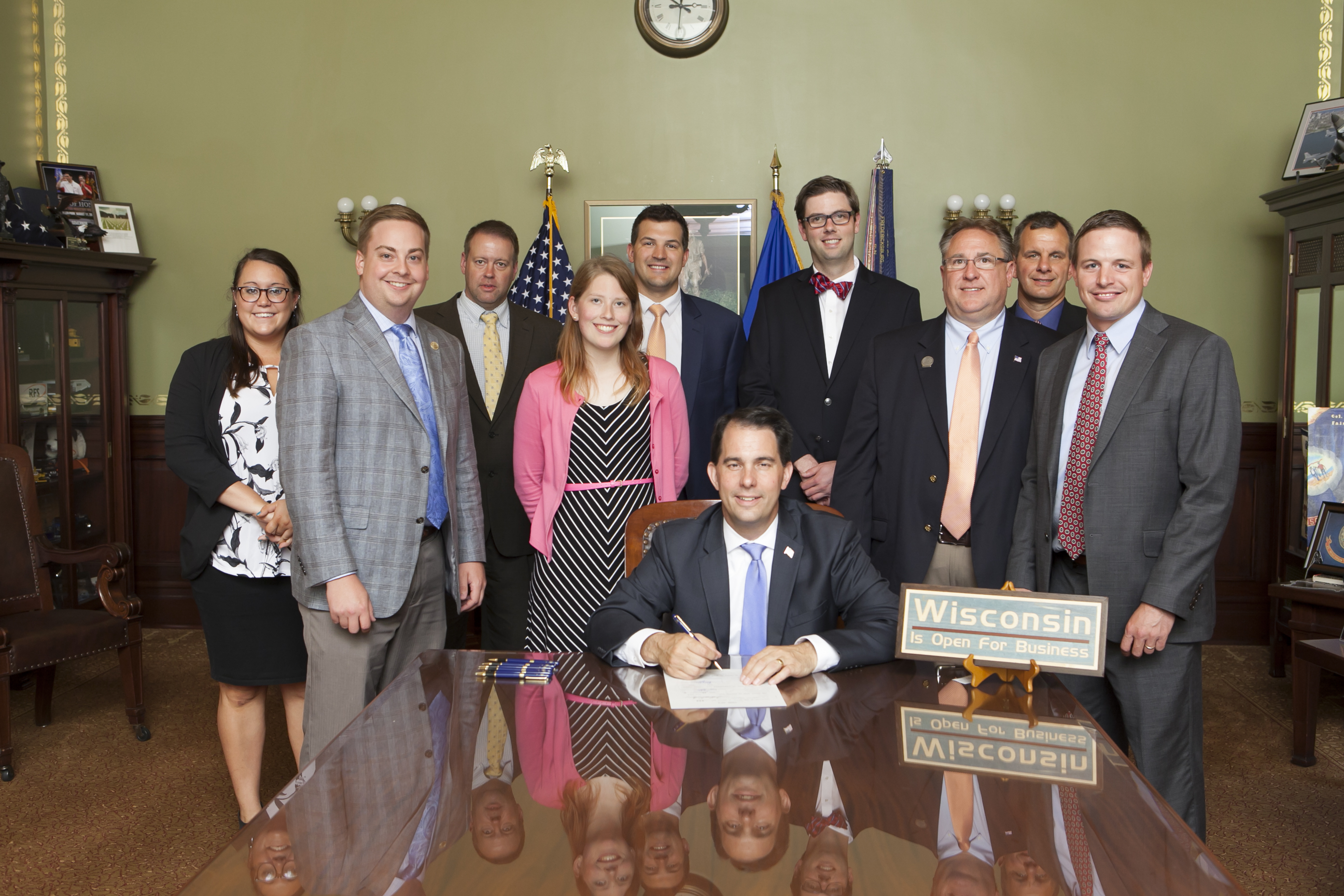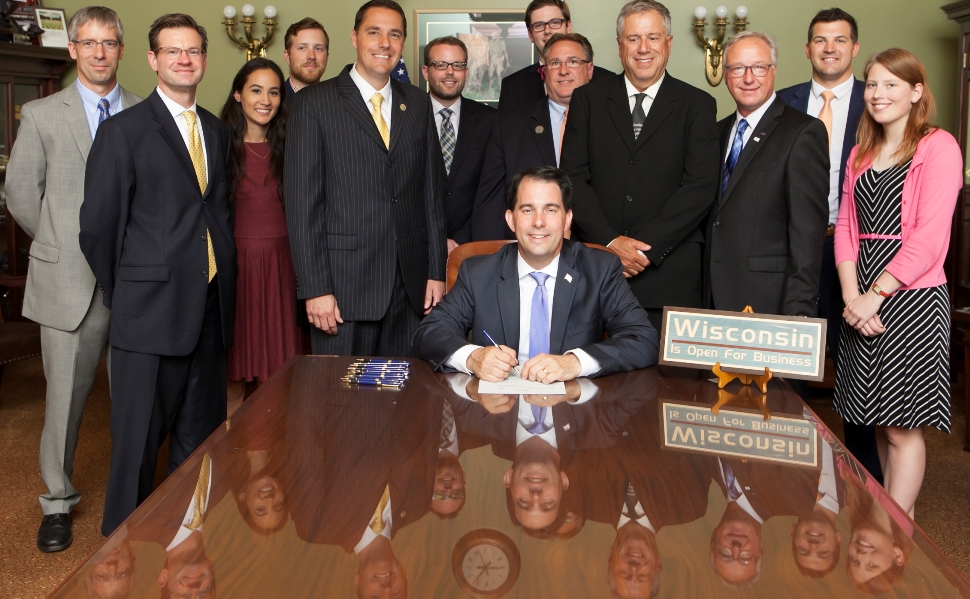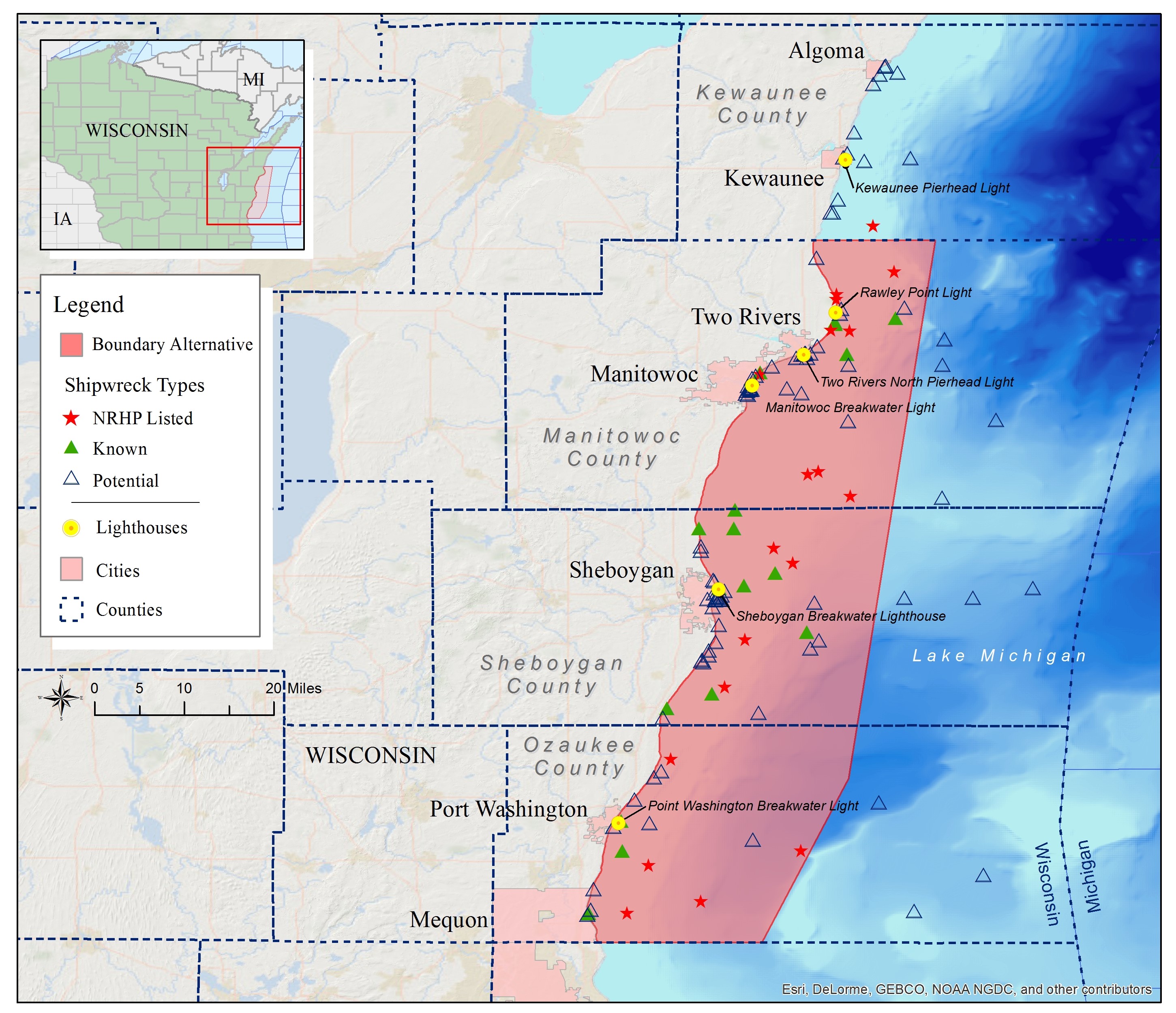
August 2, 2017
|
Foxconn Announcement |
|
This week, Foxconn Technology Group, a Taiwanese-based electronics manufacturer announced that it has selected southeast Wisconsin as the location of a $10 billion manufacturing facility. The first LCD screen factory in North America could ultimately employ 13,000 individuals with a payroll of more than $700 million. Average salaries will be $53,875 per year in addition to benefits. The construction phase alone is expected to create more than 10,000 construction jobs and an additional 60,000 indirect jobs. The economic impact to our state, as a result of this project, is unprecedented. In addition to 22,000 indirect and induced jobs, Foxconn's development project is projected to have a $7 billion annual economic impact on the state. More than $4 billion in purchases--with one-third coming from Wisconsin--are expected to be made by Foxconn, annually. Foxconn's southeastern Wisconsin facility plans to manufacture LCD screens that will be employed in various sectors, ranging from automotive to healthcare. Not only is this the largest economic development project in state history, it is the largest corporate attraction in American history. The state is looking to commit $3 billion in tax credit incentives over fifteen years. These incentives, it is important to denote, are tied to actual performance. Bottom line: if the company does not produce jobs or construct a facility, tax credits will not be awarded. These performance-based incentives will include clawbacks stipulating that if the company does not meet all of its obligations, it must back pay tax incentives to Wisconsin taxpayers. Since Foxconn's announcement of their selection of southeast Wisconsin as the location for an LCD screen manufacturing plant, my office has received innumerable emails expressing concerns regarding the potential environmental impacts of such a proposal. It is imperative to denote that while this proposal expedites a number of processes for approval, it safeguards our natural resources. Current law stipulates that for every acre of wetlands that is disturbed, 1.2 acres needs to be mitigated. The Foxconn legislation strengthens this provision by requiring that two acres of wetlands on a property be mitigated for every acre that is disturbed. A public hearing will be held on the Foxconn proposal in the Assembly Committee on Jobs and the Economy on Thursday, August 3, 2017. The hearing will commence at 1:30 pm and be held in Room 412 East State Capitol. For more information regarding the specifics of this proposal, see the Wisconsin Legislative Fiscal Bureau's analysis. The colossal Foxconn campus will be unlike anything we have ever seen in Wisconsin, the United States, or world. The campus would be 20 million square feet, the equivalent of 11 football fields. Foxconn likely selected Wisconsin as the location for their LCD screen factory because of our hardworking workforce, first-rate educational institutions, and robust economy. Overall, this project is huge news for our state and country. It is my hope that this project will result in Wisconsin becoming the Silicon Valley of the Midwest, attracting talent and innovation. Akin to every issue that comes before the legislature, I look forward to hearing your opinions on the Foxconn project; your input is important to me.
|
|
Bill Signing This week, Governor Walker signed three bills I authored into law: SB 122 relating to changing the requirement that certain city and village officials must execute and file an official bond; SB 123 relating to: the municipal treasurer's bond for tax distribution; and SB 144 relating to: resources eligible for renewable resource credits.
Governor Walker signing Assembly Bill 122 into law.
Assembly Bill 123 being signed into law.
Governor Walker signing Assembly Bill 144 into law. If you are interested in learning more about the specifics of these proposals, do not hesitate to contact my office. As always, I look forward to your input on proposals that come before the legislature or ideas for legislation. Marine Sanctuary designation In recent weeks, my office has been contacted with questions regarding the National Oceanic and Atmospheric Administration's Marine Sanctuary designation; to better respond to those concerns, I have reached out to the Wisconsin Departments of Natural Resources and Administration for more specifics. State oversight and management of beaches and waters will not dissipate as a result of the National Oceanic and Atmospheric Administration's decision to designate a national marine sanctuary in Wisconsin. Furthermore, this designation will not alter riparian rights, or state law regarding access to the area in which shoreland property owners have exclusive access. This proposal recognizes the state's sovereignty over its waters and submerged lands. According to state law, riparian owners have exclusive right to use the exposed bed of the lake in front of their property, when water levels are below normal. The aforementioned right extends to Ordinary High Water Mark (OHWM). Wisconsin holds the beds of all lakes, ponds, and navigable rivers beyond the ordinary high-water mark in a public trust, and the public has the right to use the water for recreational activities. If the sanctuary is designated, it would be co-managed by NOAA, as it is herein referred, and the State of Wisconsin, and a Memorandum of Agreement would be established. NOAA will also establish a sanctuary advisory council, made up of members from the public with meetings open to the public to gather input and advice on sanctuary management. National marine sanctuary councils are community-based advisory groups established to provide advice and recommendations to the superintendent on issues including management, science, service, and stewardship. Additionally, NOAA, in collaboration with the state, would conduct regular sanctuary management plan reviews, during which time the public has the opportunity to provide input. The periodic management plan reviews allow national marine sanctuaries the opportunity to look at how the area is changing and adaptively manage in collaboration with our state, local, and federal partners, and engage the public in the decision making process. As described in the proposal's Draft Environmental Impact Statement, NOAA recognizes that commercial shipping on the Great Lakes is an important activity that support the nation's economy. The proposed sanctuary is not expected to have adverse impacts on the commercial shipping industry. NOAA's proposal did not include the commercial ports of Two Rivers, Sheboygan, Manitowoc, and Port Washington, in the sanctuary boundary. NOAA excluded these areas based on scoping comments by the Lake Carriers' Association, members of the shipping community, and elected officials. The aforementioned groups requested that the ports not be included within the boundary, so as to avoid any restriction or prohibition on port operations deemed "critical to the local, regional, and national economies," including dredging (page 35 of the DEIS). Additionally, with the passage of the Coast Guard Authorization Bill of 2015, the United States Coast Guard and Environmental Protection Agency regulations prohibiting ballast water exchange in national sanctuaries would not apply to this proposed sanctuary. Ballast operations would continue as currently carried out. In regards to federal funding, the United States House of Representatives Committee on Natural Resources adding funding to the National Marine Sanctuary Program for fiscal year 2017. I believe that may be in response to the Wisconsin and Maryland nominations that are moving forward with this designation.
NOAA's preferred proposal (Boundary: 1,075 square miles; known shipwrecks: 37; potential shipwrecks: 80). Have a great week,
Stay up to date One of the best ways to stay up to date with what is happening in Madison is to sign up for the legislature's notification tracking service. This service affords you with the opportunity to track legislative activities in Madison. Upon creation of a free account, you can sign up to receive notifications about specific bills or committees as well as legislative activity pertaining to a subject area (i.e. real estate, education, health). You can sign up for this service at any time. You can also follow me on Facebook to see what
I have been doing in Madison and around the 60th Assembly
District.
Please recommend the page to your friends and family members.
|
If you would like to be removed from future mailings, email me to unsubscribe.
State Capitol Room 309 North-PO Box 8952, Madison, WI 53708
(608) 267-2369
Email: Rep.Rob.Brooks@legis.Wisconsin.gov
